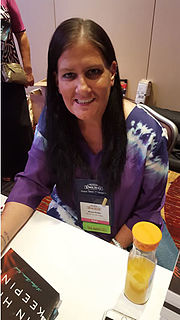A Quote by Karen Marie Moning
Once, long ago in her world, a sunny day in spring was her favorite, but now a sunny day in winter delights her more. It is the perfect metaphor for their love. Sunshine on ice. She warms his frost. He cools her fever.
Related Quotes
In fact her maturity and blood kinship converted her passion to fever, so it was more affliction than affection. It literally knocked her down at night, and raised her up in the morning, for when she dragged herself off to bed, having spent another day without his presence, her heart beat like a gloved fist against her ribs. And in the morning, long before she was fully awake, she felt a longing so bitter and tight it yanked her out of a sleep swept clean of dreams.
She craved a presence beside her, solid. Fingertips light at the nape of her neck and a voice meeting hers in the dark. Someone who would wait with an umbrella to walk her home in the rain, and smile like sunshine when he saw her coming. Who would dance with her on her balcony, keep his promises and know her secrets, and make a tiny world wherever he was, with just her and his arms and his whisper and her trust.
Eventually she came. She appeared suddenly, exactly like she'd done that day- she stepped into the sunshine, she jumped, she laughed and threw her head back, so her long ponytail nearly grazed the waistband of her jeans. After that, I couldn't think about anything else. The mole on the inside of her right elbow, like a dark blot of ink. The way she ripped her nails to shreds when she was nervous. Her eyes, deep as a promise. Her stomach, pale and soft and gorgeous, and the tiny dark cavity of her belly button. I nearly went crazy.
...the girl longed for a love that could not be ended by death. From the time she was young, she knew that her true love was there, somewhere, living a life that would one day intersect her own. Knowing this made every day full of sweet possibility. Knowing that her true love lived and breathed and went about his day under her same sun made her fears vanish, her sorrows small, and her hopes high. Though she did not yet know his face, the color of his eyes, still she knew him better than anyone else knew him, knew his hopes and dreams, what made him laugh and cry.
When a man touches a woman's body, he is not just touching her body. It goes MUCH DEEPER than that for a woman. He is touching parts of her soul-parts as diverse as how she feels about being a grandmother some day, to what is her favorite ice cream, to how much she loves her pet, and to her opinion of how the current President is governing. The man wants a sexual encounter and love is far from his mind; she desires permanence, commitment, safety, and security.
His sympathy made tears spring to Lina's eyes. Doon looked startled for a moment, and then he took a step toward her and wrapped his arms around her. He gave her a squeeze so quick and tight that it made her cough, and then it made her laugh. She realized all at once that Doon--thin, dark-eyed Doon with his troublesome temper and his terrible brown jacket and his good heart--was the person that she knew better than anyone now. He was her best friend.
When someone you love dies, and you're not expecting it, you don't lose her all at once; you lose her in pieces over a long time—the way the mail stops coming, and her scent fades from the pillows and even from the clothes in her closet and drawers. Gradually, you accumulate the parts of her that are gone. Just when the day comes—when there's a particular missing part that overwhelms you with the feeling that she's gone, forever—there comes another day, and another specifically missing part.
Her [Eleanor Roosevelt] father was the love of her life. Her father always made her feel wanted, made her feel loved, where her mother made her feel, you know, unloved, judged harshly, never up to par. And she was her father's favorite, and her mother's unfavorite. So her father was the man that she went to for comfort in her imaginings.
His gaze narrowed and she could see his hands twitching again like he’d love nothing more than to throttle her. She was beginning to think it was an affliction of his. Did he go around wanting to choke the life out of everyone or was she special in that regard? “I’m afraid ’tis an urge that is entirely original to you,” the laird barked. She clamped her mouth shut and closed her eyes. Mother Serenity had vowed one day Mairin would regret her propensity to blurt out her least little thought. Today just might be that day.
The Winter Woman is as wild as a blizzard, as fresh as new snow. While some see her as cold, she has a fiery heart under that ice-queen exterior. She likes the stark simplicity of Japanese art and the daring complexity of Russian literature. She prefers sharp to flowing lines, brooding to pouting, and rock and roll to country and western. Her drink is vodka, her car is German, her analgesic is Advil. The Winter Woman likes her men weak and her coffee strong. She is prone to anemia, hysteria, and suicide.
Alone, she took hot baths and sat exhausted in the steaming water, wondering at her perpetual exhaustion. All that winter she noticed the limp, languid weight of her arms, her veins bulging slightly with the pressure of her extreme weariness ... one day in January she drew a razor blade lightly across the inside of her arm, near the elbow, to see what would happen.
I missed the sound of her shuffling her homework while I listened to music on her bed. I missed the cold of her feet against my legs when she climbed into bed. I missed the shape of her shadow where it fell across the page of my book. I missed the smell of her hair and the sound of her breath and my Rilke on her nightstand and her wet towel thrown over the back of her desk chair. It felt like I should be sated after having a whole day with her, but it just made me miss her more.
In a way, her strangeness, her naiveté, her craving for the other half of her equation was the consequence of an idle imagination. Had she paints, or clay, or knew the discipline of the dance, or strings, had she anything to engage her tremendous curiosity and her gift for metaphor, she might have exchanged the restlessness and preoccupation with whim for an activity that provided her with all she yearned for. And like an artist with no art form, she became dangerous.


































